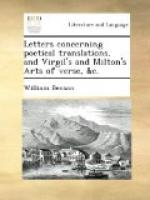To find out this, I consulted the middling sort of Poets, or the first Practicers in this Art: In this Enquiry I observ’d from Hesiod and Ennius among the Greek and Latin Poets, and afterwards from Ovid with relation to the latter, and which I am now to speak of, that the common Pause or Stop in all Latin Heroick Verse (to say nothing of the Greek, which agrees with it in this Respect) is upon the 1st Syllable of the 3d Foot. For Example,
“Ante mare & tellus | & quod tegit omnia, caelum, Unus erat toto | Naturae vultus in orbe, Quem dixere Chaos | rudis indigestaque moles; Nec quicquam, nisi pondus, iners; | congestaque eodem Non bene junctarum | discordia semina rerum. Nullus adhuc mundo | praebebat lumina Titan; Nec nova crescendo | reparabat cornua Phoebe, Nec circumfuso | pendebat in aere tellus—
Here we have eight Lines all paused in the same Place, except one, (the 4th); and in this kind of Measure the Metamorphosis is generally written; from whence I collected the natural Pause in the Latin Language to be as abovementioned: I then consulted the best Poem of the best Latin Poet, which begins with these Lines.
“Quid faciat laetas segetes, | quo Sydere Terram Vertere, | Maecenas, | ulmisque adjungere Vites Conveniat, | quae cura Boum, | qui cultus habendo Sit Pecori, | Apibus quanta experientia parcis Hinc canere incipiam |.—
Here I observed that this great Master had artfully avoided the common Pause till he came to the fifth Line; and he takes care to do it as much as possible throughout the whole Work; from whence arises one of the most material Differences in the Versification of Ovid and Virgil; and to produce more Examples would be a needless Labour. In this Place let me take Notice that it is on Account of Varying the Pause that Virgil makes his broken Lines in the AEneid, which suspend all Pauses, and the Ear is relieved by this Means, and attends with fresh Pleasure. Whoever intends to come up to Virgil in Harmony in Heroick Numbers in any long Work, must not omit this Art.
2d, The next thing to be attended to, is, The Inversion of the Phrase. This flings the Stile out of Prose, and occasions that Suspense which is the Life of Poetry. This builds the lofty Rhyme (as Milton expresses it) in such manner as to cause that Majesty in Verse of which I have said so much before, that there is no need of saying any thing more here.
3d. The third thing is, The adapting the Sound to the Sense.
Most People know such Instances of this Nature, as Quadrupedante, &c. and Illi inter sese, &c. But few attend to an Infinity of other Examples.
How is the Verse drawn out in length, and how does it labour when strong heavy Land is to be ploughed!
“—Ergo, age terrae
Pingue solum, primis extemplo a Mensibus
Anni
Fortes invortant tauri.—




